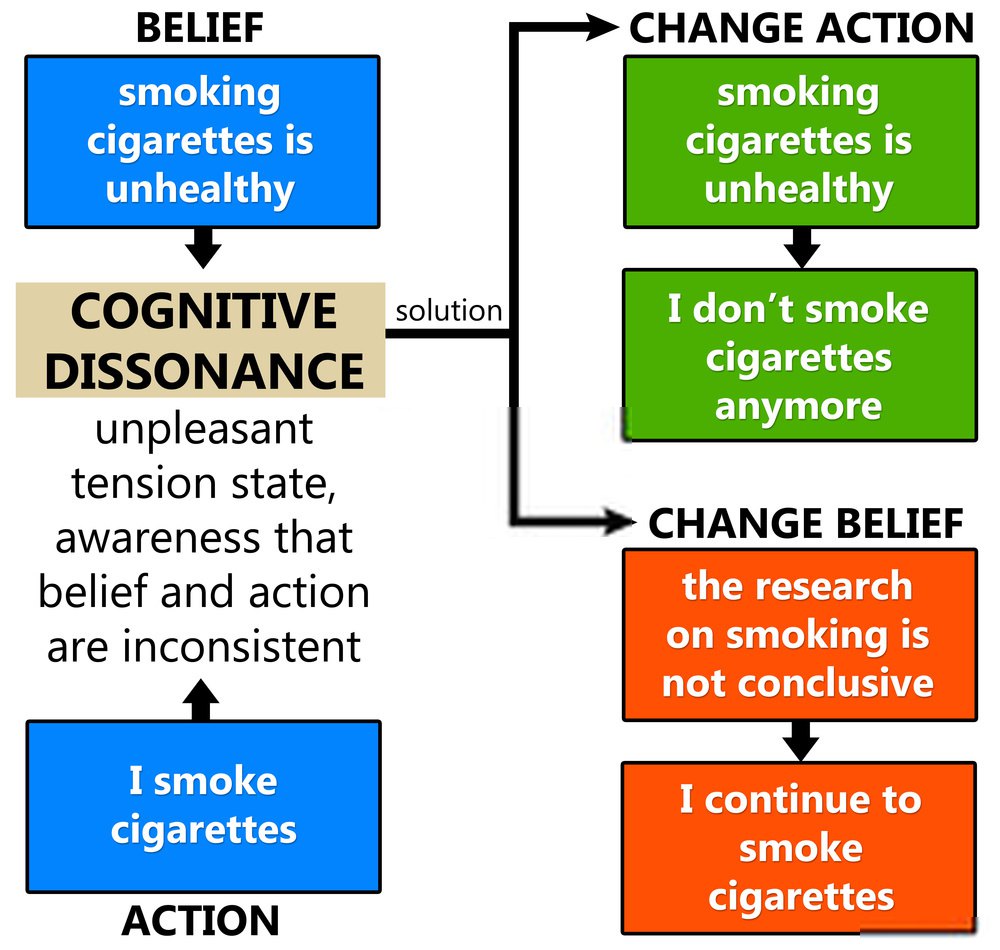How often have you wondered how someone does extremely bad or outright stupid acts and tries to confidently justify it? Welcome to cognitive dissonance, this is what leads us to justify our inconsistent actions with convincing ourselves that action was justified.
There is quite often a large gap between what we think and what we do. When we do something despite knowing it to be immoral, unethical, wrong or stupid, we have a bad conscience.
What happens then is, our brain tries to justify (reach internal consistency) the act by seeking out to find evidence that supports that we did the right thing after all.
Example of Cognitive Dissonance is best illustrated by the figure below

We all know that smoking is unhealthy? Why then some of us keep on smoking. The cognitive dissonance example actually illustrates the same.
They justify their actions by changing the belief rather than the recommended action, which in this case is to quit smoking.
Their new and reinforced changed belief is that the research on smoking is inconclusive or so many smokers live long and even healthier lives. We don’t rationally consider so many conclusive research reports that prove smoking is unhealthy.
A small number of people who survive to live a healthier and long life overshadow data about majority of the people who don’t. This is quite a powerful self-convincing mechanism indeed.
Origin of Cognitive Dissonance Model
The psychologist Leon Festinger used the term ‘cognitive dissonance’ to describe our state of mind when our actions are not consistent with our beliefs – for example when we smack a child, even though we condemn violence against children.
But why is it so difficult for us to acknowledge our mistakes? Why do we even go as far as defending our actions when we are confronted with their shortcomings? Rather than asking for forgiveness or regret, we chose one of the more unlikeable human attributes: self-justification.
This acts as a protective mechanism that enables us to sleep at night and frees us from self-doubt. We see only what we want to see, and ignore everything that contradicts our view. We look for arguments that reinforce our position.
But how can we overcome this dissonance? Either by changing our behavior or our attitude.
How to recognize cognitive dissonance?
It is very important to recognize cognitive dissonance in self and others. By understanding that cognitive dissonance is into play, you can make better decisions by reducing or eliminating them. Some of the signs that you look for are:
- Prejudging facts
- Not believing data
- Unrealistic expectations
- Over-reliance on individual or institutions
- Not prepared to listen to anything against any specific entity
These are some of the common signs of cognitive dissonance and you need to analyze whether you or someone else is demonstrating these signals. Once recognized you need to understand that there is dissonance and it needs to be overcome.
A great nation is like a great man: when he makes a mistake, he realizes it. Having realized it, he admits it. Having admitted it, he corrects it. He considers those who point out his faults as his most benevolent teachers.
 |
| Cognitive Dissonance impacts every Individual nobody is immune The fact is -cognitive dissonance impacts everyone, and unconsciously has a major part to play in a person’s daily judgments and decisions. Even though cognitive dissonance mostly seems like a negative effect, it can also help people change and grow in a positive way. Learning to recognize cognitive dissonance can help individuals make better decisions and thus is also considered as a decision-making tool. Through awareness of conflicting beliefs and actions, people can address their habits and bring their behaviors in line with their values. |
When were you last aware of cognitive dissonance in yourself? And when in your partner?


